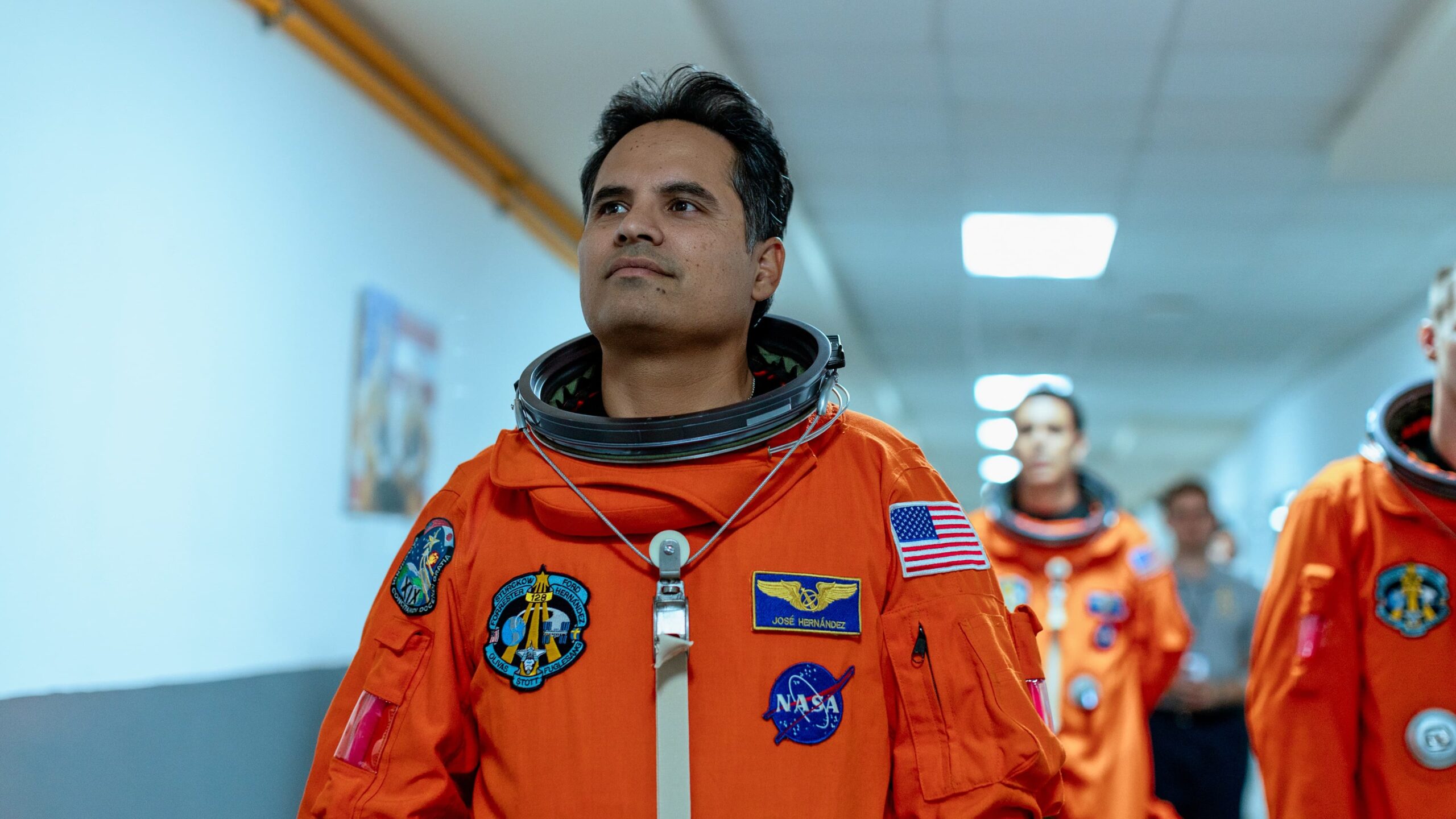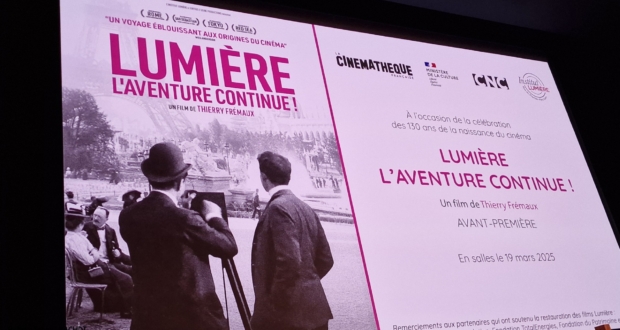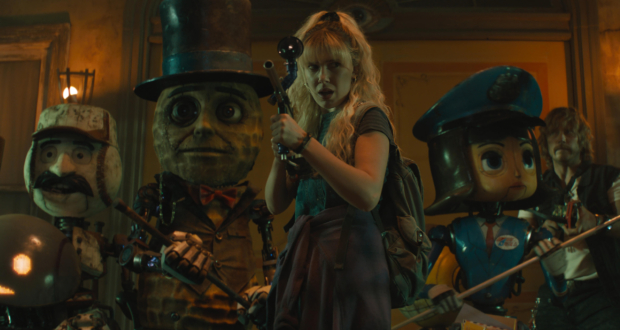A Million Miles Away is a biographical drama film that chronicles the remarkable life journey of José M. Hernández, the first Mexican-American astronaut. Starring Michael Peña as José Hernández, Garret Dillahunt as Frederick W. Sturckow, and Rosa Salazar as Adela Hernández, the film weaves together a poignant narrative of ambition, determination, and the immigrant experience.
The Good:
At its core, A Million Miles Away is the story of an underprivileged migrant who literally dares to dream big and reach for the stars. The film’s premise is inherently inspiring. The film also unfolds with an authentic portrayal of José Hernández’s life, filled with obstacles, sacrifices, and unyielding perseverance.
A Million Miles Away opens with a glimpse into José’s humble upbringing. José is a child of Mexican immigrants in California’s San Joaquin Valley. His parents are the embodiment of hardworking immigrants. The type of parents who instilled in him the value of education and the idea that anything is possible if you work hard enough. The family’s financial struggles and their unshakable faith in José’s potential drive the emotional core of the narrative.
Michael Peña delivers a heartfelt and convincing performance as José Hernández. He captures the essence of José’s determination, his unwavering commitment to education, and the sheer tenacity required to break free from the cycle of poverty. Throughout the film, Peña manages to convey José’s complex mix of vulnerability and determination, making the character relatable and endearing.
The film’s supporting cast, including Garret Dillahunt as NASA astronaut Frederick W. Sturckow, adds depth to the story. Dillahunt’s portrayal of Sturckow, José’s mentor and inspiration, is nuanced and authentic. Their mentorship and eventual friendship serve as a pivotal element in José’s journey toward the stars, and the chemistry between the two actors feels genuine.
Director Alejandra Marquez Abella is known for her ability to delve into characters and their motivations. She does an admirable job of bringing José Hernández’s story to life. Dariela Ludlow dazzles with her skillful cinematography. Under her skillful guidance A Million Miles Away captures the stark beauty of the San Joaquin Valley. The film also delivers awe-inspiring visuals of space. Prieto’s work helps create a powerful juxtaposition between the humble beginnings of José’s life on Earth and his ultimate destination among the stars.
One of the film’s strengths is its attention to detail. You see this as the film meticulously depicts José’s journey. From academia to NASA’s rigorous astronaut training program, you see the attention. As the viewer, we’re taken on a rollercoaster ride of emotions. José faces academic challenges, navigates the complexities of applying to NASA, and undergoes physically and mentally demanding training. The film does an exceptional job of humanizing the astronaut selection process. There’s a relentless dedication required to overcome the incredible odds.
The film’s soundtrack, composed by Camilo Lara, is a notable highlight. The music perfectly complements the emotional depth of the story, enhancing the viewer’s connection to José’s struggles and triumphs. The combination of cinematography, acting, and music creates a powerful and immersive viewing experience.
In terms of visual effects, A Million Miles Away excels when depicting the breathtaking beauty of space. The scenes of José’s space missions are visually stunning and provide a sense of wonder and awe. These moments effectively capture the magnitude of his achievements and the vastness of the universe.
The Bad:
Where A Million Miles Away falls short, however, is in its pacing and character development. At times, the film feels rushed, glossing over crucial moments in José’s life. It could have benefited from a more leisurely exploration of his personal relationships, particularly his family dynamics and his wife’s sacrifices. These elements are touched upon but lack the depth and emotional resonance they deserve.
Rosa Salazar’s portrayal of Adela Hernández, José’s wife, is sincere but somewhat underutilized. Adela’s unwavering support and sacrifices are essential to the narrative, yet the film doesn’t delve deeply into her character or the challenges she faces as the wife of an aspiring astronaut. A more profound exploration of their relationship would have added emotional weight to the story.
The film also skims over some of José’s fellow astronaut candidates, missing an opportunity to develop secondary characters and showcase the diversity of the space program. A richer exploration of the camaraderie and competition among the candidates would have added depth to José’s journey.
Despite these shortcomings, A Million Miles Away ultimately succeeds in delivering a compelling and inspirational story. It serves as a reminder that dreams, no matter how improbable, can be achieved through unwavering determination and hard work. José Hernández’s remarkable journey from a migrant farmworker to a NASA astronaut is a testament to the American Dream, and this film encapsulates that dream beautifully.
However, the film occasionally struggles with its portrayal of space travel logistics and scientific accuracy. Some of the technical aspects, such as spacecraft operations and zero-gravity physics, are simplified for dramatic effect, which may disappoint viewers with a keen interest in space exploration. While these liberties are understandable for storytelling purposes, a more precise representation would have been added to the film’s authenticity.
Overall:
A Million Miles Away is a touching and inspirational biographical drama that admirably portrays José M. Hernández’s remarkable journey from a migrant farmworker to a NASA astronaut. Michael Peña’s heartfelt performance, supported by a strong cast and exquisite cinematography, ensures that the film is emotionally engaging.
-
Acting - 8/10
8/10
-
Cinematography/Visual Effects - 7/10
7/10
-
Plot/Screenplay - 6.5/10
6.5/10
-
Setting/Theme - 7/10
7/10
-
Watchability - 7/10
7/10
-
Rewatchability - 5/10
5/10

















